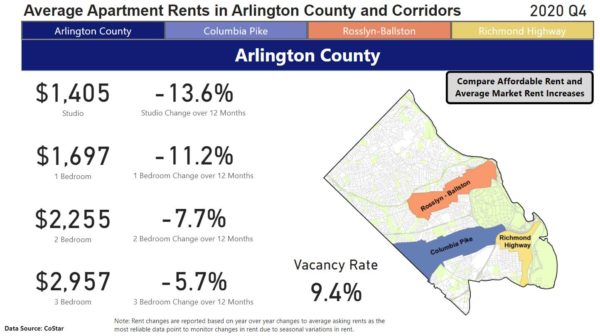 Making Room is a biweekly opinion column. The views expressed are solely the author’s.
Making Room is a biweekly opinion column. The views expressed are solely the author’s.
The year-long (and counting) pandemic has caused a large increase in the apartment vacancy rate in Arlington.
While stories of an urban exodus are overblown, national research indicates that the pandemic has decreased the inflow of new residents. Some of Arlington’s landlords have responded to high vacancy rates by lowering rents. This is welcome news for renters who struggle to afford payment or want to upgrade their home.
But landlords also have another tactic to fill vacant apartments, by taking long-existing units off the market for long-term tenants and switching them to hotel units or short-term rentals. The County Board should scrutinize these requests and consider the benefits of abundant housing, even if it means large landlords must charge competitive prices. Renters should be the ones benefiting from the lower demand.
Arlington’s vacancy rate is relatively high at 9.4% across the county. This is slightly above what is considered healthy for a rental market (7-8%), but it is still below the rate that would be worrisome. County-wide, landlords have responded by lowering nearly 15%. However, given that Arlington had a 4% vacancy rate before the pandemic, it is not surprising that landlords would look for other options to reduce the number of vacant units they carry.
Dittmar, a locally-based company that owns and manages dozens of older apartment buildings throughout Northern Virginia, has asked the County Board for permission to convert 5% of its vacant inventory at three properties in the R-B corridor as short-term rental units for up to 5 years. (This is a different situation from a new development requesting temporary hotel zoning during its lease-up phase.)
Dittmar’s letter requesting this minor site plan revision, explains:
Due to the ongoing COVID-19 pandemic, the Applicant has experienced unprecedented levels of vacancy in residential units. It believes that, as business travel begins to return to the region in the future, there will be a demand for leases of furnished units for less than 30 days. The Applicant seeks to serve this group of people by converting a portion of the residential units on the Property to Flexible Units to allow for a more socially-distanced temporary stay in Arlington.
In their Statement of Justification, Dittmar doesn’t discuss what steps it has taken to fill their vacant units with long-term residents, such as how deeply they have cut rents or other financial incentives they have offered.
I’m generally of the opinion that property owners should have significant leeway to build and use their property as they see fit. But before Dittmar is allowed to remove housing rather than offer competitive rates to renters, the County needs to carefully consider the possible precedents and likely outcomes. Arlington faces a significant housing shortage in the coming years. Allowing landlords to curtail existing supply only exacerbates Arlington’s current policies that significantly limit new housing below what the market would support.
If the County allows this to proceed, what other owners of aging buildings will look to regulatory changes instead of trying to fill their units with people looking for housing? What would the impact of these kinds of changes be on the county’s existing, and already struggling, hotel market? And what would the impact of reducing the housing supply be on future residents? To rubber stamp this request without engaging these questions is putting business interests above the needs of the community.
Arlington does not have too much long-term rental housing. We don’t need to give landlords an outlet to avoid lowering rents, at least not without community benefits. In tight rental markets like Arlington, where new housing consistently falls behind job growth, renters rarely hold the advantage. We are already seeing a rebound in rental prices. The pandemic is one of the few opportunities for leverage, especially for renters at the margins who are already struggling with job loss and other tragedies.
If property owners can’t make enough profit in a more renter-friendly market, we need to decrease the costs from the site plan review process and lower the expectation for community benefits. People benefit from abundant housing in high opportunity places like Arlington.
Jane Fiegen Green, an Arlington resident since 2015, proudly rents an apartment in Pentagon City with her family. By day, she is the Membership Director for Food and Water Watch, and by night she tries to navigate the Arlington Way. Opinions here are her own.


